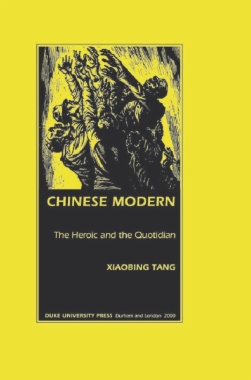Chinese Modern examines crucial episodes in the creation of Chinese modernity during the turbulent twentieth century. Analyzing a rich array of literary, visual, theatrical, and cinematic texts, Xiaobing Tang portrays the cultural transformation of China from the early 1900s through the founding of the People’s Republic, the installation of the socialist realist aesthetic, the collapse of the idea of utopia in the aftermath of the Cultural Revolution, and the gradual cannibalization of the socialist past by consumer culture at the century’s end. Throughout, he highlights the dynamic tension between everyday life and the heroic ideal.
Tang uncovers crucial clues to modern Chinese literary and cultural practices through readings of Wu Jianren’s 1906 novel
The Sea of Regret and works by canonical writers Lu Xun, Ding Ling, and Ba Jin. For the midcentury, he broadens his investigation by considering theatrical, cinematic, and visual materials in addition to literary texts. His reading of the 1963 play
The Young Generation reveals the anxiety and terror underlying the exhilarating new socialist life portrayed on the stage. This play, enormously influential when it first appeared, illustrates the utopian vision of China’s lyrical age and its underlying discontents—both of which are critical for understanding late-twentieth-century China. Tang closes with an examination of post–Cultural Revolution nostalgia for the passion of the lyrical age.
Throughout
Chinese Modern Tang suggests a historical and imaginative affinity between apparently separate literatures and cultures. He thus illuminates not only Chinese modernity but also the condition of modernity as a whole, particularly in light of the postmodern recognition that the market and commodity culture are both angel and devil. This elegantly written volume will be invaluable to students of China, Asian studies, literary criticism, and cultural studies, as well as to readers who study modernity.

